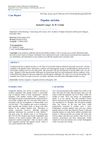 7 citations,
December 2015 in “International Journal of Dermatology”
7 citations,
December 2015 in “International Journal of Dermatology” New and known mutations in the hairless gene cause a hair loss condition called Atrichia with papular lesions.
 9 citations,
June 2000 in “Journal of The American Academy of Dermatology”
9 citations,
June 2000 in “Journal of The American Academy of Dermatology” Mutation in hairless gene may increase hair loss risk.
 2 citations,
June 2000 in “Journal of The American Academy of Dermatology”
2 citations,
June 2000 in “Journal of The American Academy of Dermatology” Mutation in hairless gene may increase hair loss risk.
 19 citations,
May 2006 in “Clinical and Experimental Dermatology”
19 citations,
May 2006 in “Clinical and Experimental Dermatology” Researchers found a new mutation causing total hair loss from birth.
26 citations,
October 2002 in “Journal of Investigative Dermatology” A specific gene mutation causes congenital hair loss.
 181 citations,
January 2009 in “Nature Genetics”
181 citations,
January 2009 in “Nature Genetics” Certain mutations in a hair growth-related gene cause a type of genetic hair loss.
 14 citations,
July 2010 in “Experimental Dermatology”
14 citations,
July 2010 in “Experimental Dermatology” A new mutation in the HR gene causes hair loss in a specific family.
 3 citations,
January 2019 in “Jikken doubutsu ihou/Jikken doubutsu/Experimental animals/Jikken Dobutsu”
3 citations,
January 2019 in “Jikken doubutsu ihou/Jikken doubutsu/Experimental animals/Jikken Dobutsu” Pigs without the Hairless gene showed skin and thymus changes, useful for studying human hair disorders.
78 citations,
November 2005 in “Endocrinology” Hairless protein can block vitamin D activation in skin cells.
 10 citations,
February 2008 in “Photochemistry and photobiology”
10 citations,
February 2008 in “Photochemistry and photobiology” Vitamin D receptor can control the hairless gene linked to hair loss even without vitamin D.
 January 2006 in “Advances in developmental biology”
January 2006 in “Advances in developmental biology” The Hairless gene is crucial for healthy skin and hair growth.
 9 citations,
July 2011 in “Scientific Reports”
9 citations,
July 2011 in “Scientific Reports” Changes in the HR gene have influenced hair growth and may lead to hair loss conditions in humans.
 89 citations,
September 2010 in “Annual Review of Genomics and Human Genetics”
89 citations,
September 2010 in “Annual Review of Genomics and Human Genetics” The document concludes that understanding the genes and pathways involved in hair growth is crucial for developing treatments for hair diseases.
21 citations,
June 2009 in “Mammalian genome” A new mutation in the Hr gene causes hair loss in mice, similar to a human hair disorder.
3 citations,
February 2001 in “British journal of ophthalmology” An Australian with rare hair loss and eye conditions had a gene linked to both, not seen together before.
 April 2020 in “International journal of research in dermatology”
April 2020 in “International journal of research in dermatology” An 8-year-old girl has a rare, irreversible hair loss condition caused by a genetic mutation.
 January 2000 in “BioScience”
January 2000 in “BioScience” The document concludes that understanding hair biology is key to treating hair disorders, with gene therapy showing potential as a future treatment.
8 citations,
January 2011 in “International journal of trichology” Accurate diagnosis of APL is crucial to avoid unnecessary treatments.
 14 citations,
July 2001 in “American Journal of Human Genetics”
14 citations,
July 2001 in “American Journal of Human Genetics” Haplogroup X found in Altaian population supports Amerindian origin.
 15 citations,
April 2002 in “British Journal of Dermatology”
15 citations,
April 2002 in “British Journal of Dermatology” Hairless gene not strongly linked to baldness.
 36 citations,
October 2000 in “British Journal of Dermatology”
36 citations,
October 2000 in “British Journal of Dermatology” A different gene near the hairless gene on chromosome 8p21 causes a rare hair loss condition in a German family.
 3 citations,
March 2010 in “Dermatologica Sinica”
3 citations,
March 2010 in “Dermatologica Sinica” A Taiwanese patient had hair loss and skin bumps without the usual gene mutation, suggesting other genetic factors might be involved.
 10 citations,
January 2010 in “Veterinary pathology”
10 citations,
January 2010 in “Veterinary pathology” A new mutation in the hairless gene causes hair loss and skin wrinkling in mice.
 16 citations,
April 2018 in “Animal Genetics”
16 citations,
April 2018 in “Animal Genetics” Researchers found two genes that may explain why some Casertana pigs don't have hair.
 13 citations,
November 2013 in “Journal of Endocrinology/Journal of endocrinology”
13 citations,
November 2013 in “Journal of Endocrinology/Journal of endocrinology” Vitamin D receptor helps control hair growth genes in skin cells.
 43 citations,
December 2013 in “Seminars in Cell & Developmental Biology”
43 citations,
December 2013 in “Seminars in Cell & Developmental Biology” Genetic mutations can cause hair growth disorders by affecting key genes and signaling pathways.
139 citations,
September 2001 in “The journal of investigative dermatology/Journal of investigative dermatology” Mutations in the Vitamin D receptor gene can cause hair loss similar to mutations in the Hairless gene.
 52 citations,
October 1999 in “Developmental Dynamics”
52 citations,
October 1999 in “Developmental Dynamics” Mutations in the hairless gene in mice affect its expression and lead to a range of developmental issues in multiple tissues.
17 citations,
May 2012 in “Journal of biological chemistry/The Journal of biological chemistry” Hairless protein affects hair follicle structure by regulating the Dlx3 gene.
 6 citations,
July 2017 in “Biochemical and Biophysical Research Communications”
6 citations,
July 2017 in “Biochemical and Biophysical Research Communications” The Hairless gene is crucial for hair cell development, affecting whether skin cells become hair or skin and oil gland cells.























